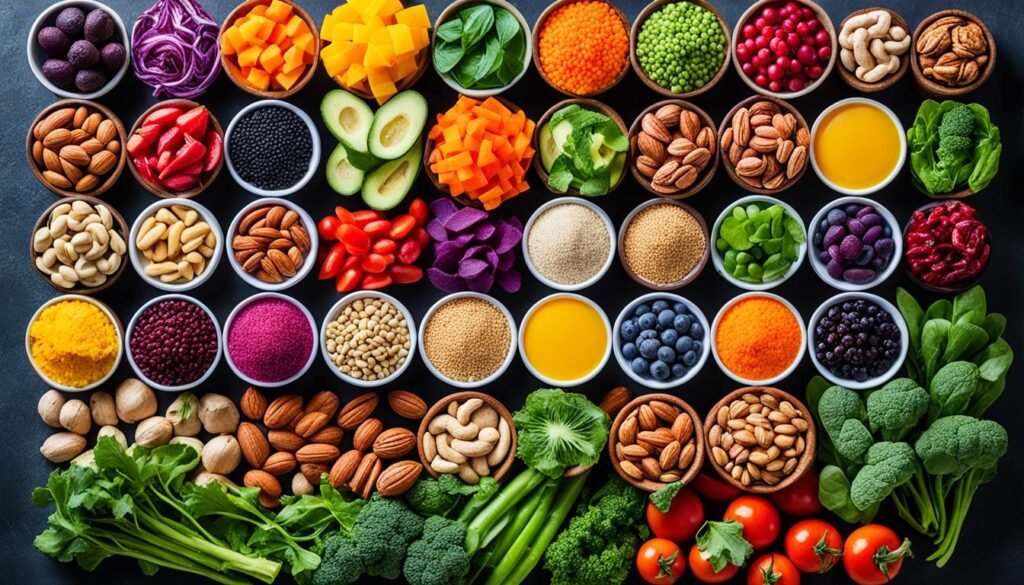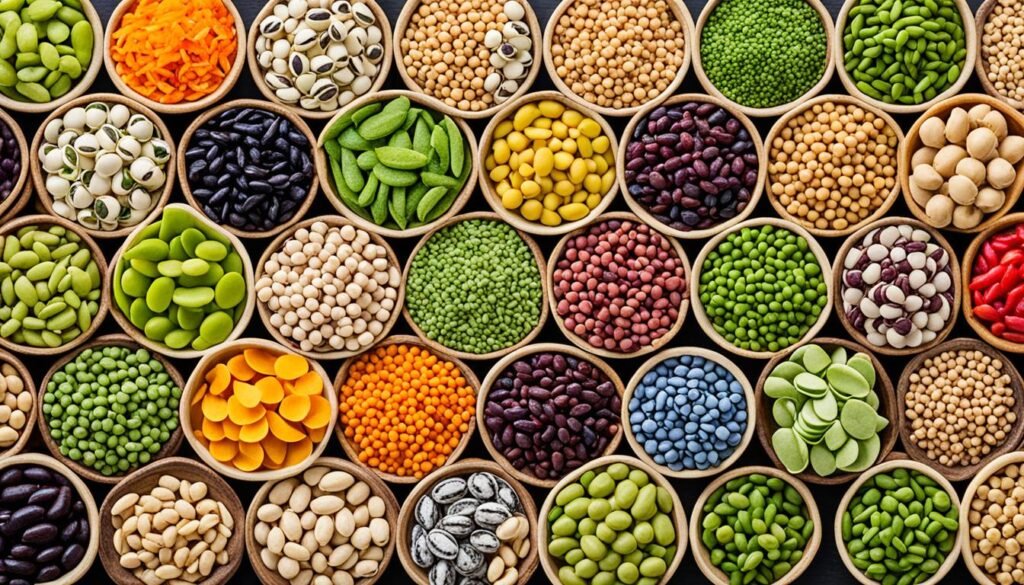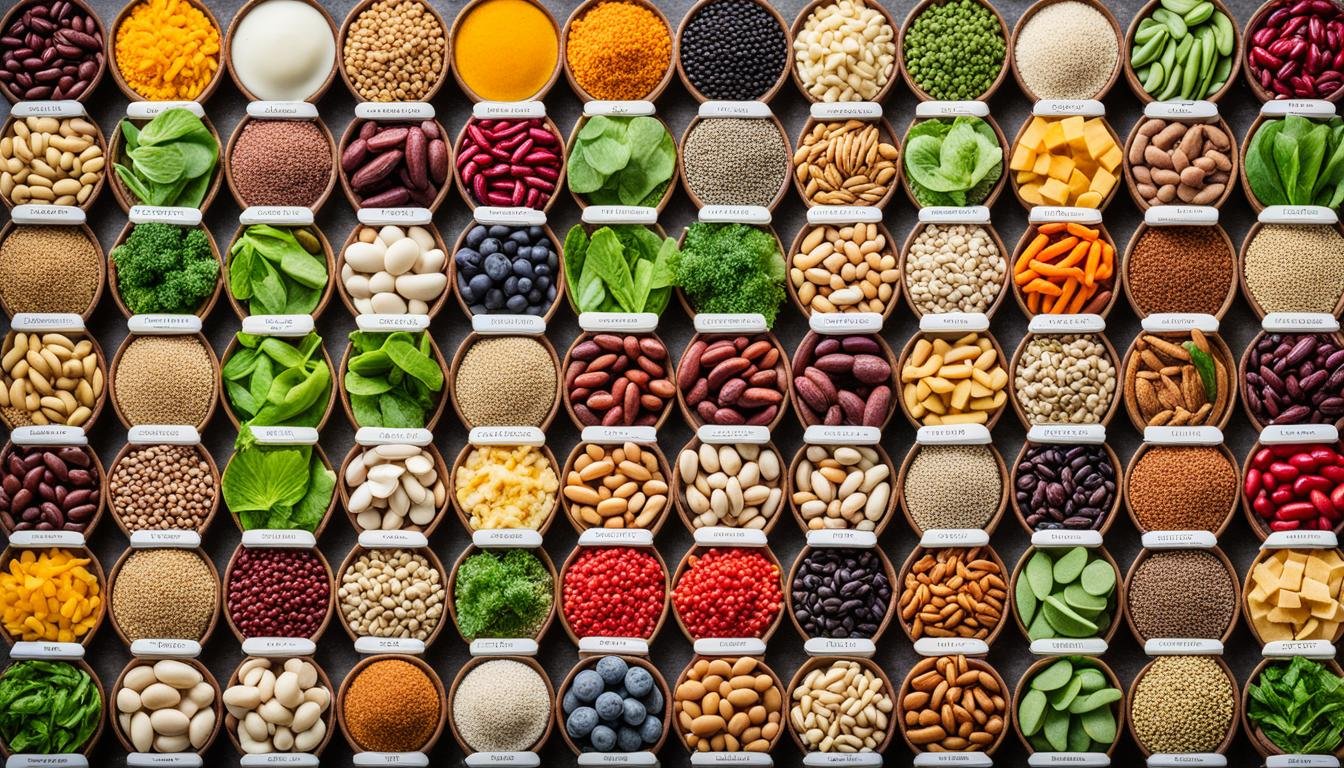As I sat down to enjoy my lunchtime salad, I couldn’t help but marvel at the vibrant array of plant-based protein sources. From the hearty lentils to the nutty quinoa, each ingredient offered a unique flavor and a powerful nutritional punch. I’ve discovered the incredible benefits of incorporating these plant-based protein powerhouses into my daily routine.
In this article, we’ll explore the top 15 plant-based protein sources that can transform your meals and elevate your overall well-being. Whether you’re a seasoned plant-based enthusiast or just starting your journey, you’ll find a wealth of delicious and nutritious options. Get ready to unlock the true potential of plant-based proteins and nourish your body with the very best that nature has to offer.
Key Takeaways
- Plant-based protein sources offer a wide array of nutrients and health benefits.
- Incorporating a variety of plant-based proteins can help you meet your daily protein needs.
- Legumes, grains, and nuts/seeds are excellent sources of plant-based proteins.
- Exploring different plant-based protein sources can make your meals more diverse and flavorful.
- Switching to plant-based proteins can be a sustainable and environmentally-friendly choice.
Unleashing the Power of Plant-Based Protein Sources
Plant-based proteins are key to good nutrition. They are full of nutrients and offer many benefits for our health and the planet. Eating these proteins can change how we eat every day.
Why Plant-Based Proteins Matter
Plant-based proteins are great for our health and the planet. They come from many sources and have lots of benefits. These include:
- Improved heart health and reduced risk of chronic diseases
- Enhanced weight management and supporting healthy body composition
- Reduced environmental impact compared to animal-based proteins
- Increased fiber intake and improved digestive function
Exploring the Diverse World of Plant Proteins
Plant-based proteins are more than just legumes and grains. They include a wide variety of foods, each with its own nutrition and ways to cook. From quinoa’s protein to nuts and seeds, the benefits of plant proteins are many.
Learning about the importance of plant-based proteins and the types of plant-based proteins opens up new cooking possibilities. It’s a step towards a healthier and more sustainable life.

“Embracing the power of plant-based proteins is not just a dietary choice, but a revolution in how we nourish our bodies and our planet.”
Versatile Legumes: Your Protein Powerhouses
Legumes are amazing for getting plant-based protein. They are packed with nutrients and are great for your health. Lentils and chickpeas are two top choices that are really good for you.
Lentils: A Nutrient-Dense Superfood
Lentils as protein are a nutritional powerhouse. They are full of high-quality protein, vitamins, minerals, and fiber. They have a lot of iron, folate, and magnesium, which are great for your health.
Lentils are super versatile. You can use them in soups, stews, curries, and salads. They can be cooked, sprouted, or made into flour. Adding lentils to your meals is a great way to get more protein.
Chickpeas: Versatile and Packed with Protein
Chickpeas, also known as garbanzo beans, are another great legume. Chickpeas as protein offer 15 grams per cup. They are full of fiber, minerals, and complex carbs, making them a great choice for plant-based diets.
Chickpeas can be roasted, mashed, or turned into hummus. They’re perfect for making vegetarian and vegan dishes like curries, stews, and burgers. Chickpeas are very versatile and delicious.
If you’re into plant-based eating or just starting out, lentils and chickpeas are a must-try. They are sure to become favorites in your kitchen.

Nature’s Nutritious Bounty: Quinoa and Beyond
Quinoa is a top choice for plant-based protein. It’s known as a “complete protein” because it has all the essential amino acids. This makes it a great addition to a healthy diet. But there are many other plant-based proteins to explore too.
Quinoa: The Complete Protein Grain
Quinoa is a superfood with a great nutritional profile. It’s full of quinoa as plant-based protein and vitamins like iron, zinc, and B vitamins. You can use quinoa in many dishes, from salads to pilafs, making it a favorite for health lovers.
There are many other other plant-based protein sources in the plant world. You can find protein in greens like spinach and kale, and in legumes like lentils and chickpeas. These options are great for adding more plant-based protein to your meals.
If you’re new to plant-based eating or already love it, there’s a lot to try. Adding different plant-based proteins to your diet can be healthy and tasty. The plant kingdom offers many options for those looking to eat more plant-based.
| Plant-Based Protein Source | Protein Content (per 100g) |
|---|---|
| Quinoa | 4.4g |
| Lentils | 9g |
| Chickpeas | 15g |
| Spinach | 2.9g |
| Kale | 2.9g |
“Quinoa is not only a delicious and versatile ingredient, but it’s also a nutritional powerhouse that can help us meet our protein needs through plant-based sources.”
Nuts and Seeds: Crunchy Protein Boosters
Nuts and seeds are great for any plant-based diet. They are packed with protein, vitamins, minerals, and taste great. Adding them to your meals and snacks can make a big difference.
Almonds: A Nutritional Heavyweight
Almonds are a superfood for plant-based protein. They are full of protein, fiber, and important nutrients. Adding almonds to your diet is a smart choice for more protein.
You can eat them as a snack, on salads, or in smoothies. Almonds make your plant-based meals more interesting and nutritious.
Chia Seeds: Tiny but Mighty
Chia seeds may be small but they are powerful. They are a complete protein, meaning they have all nine essential amino acids. Adding them to your food is easy and healthy.
Put chia seeds on yogurt, in baked goods, or in puddings. They make your plant-based dishes more nutritious. These tiny seeds can greatly improve your health and wellness.
FAQ
What are the top plant-based protein sources?
Lentils, chickpeas, quinoa, almonds, and chia seeds are great plant-based protein sources. They are packed with protein, fiber, and vitamins that are good for your health.
Why are plant-based proteins important?
Plant-based proteins are key for a healthy diet. They help with muscle growth, keep blood sugar stable, and support heart health. Eating a mix of plant-based proteins can help you get enough protein and other nutrients.
How can I incorporate more plant-based proteins into my diet?
There are many tasty ways to add plant-based proteins to your meals. Swap meat with lentils or chickpeas in dishes like chili or curry. Add quinoa to salads and bowls, or snack on nuts and seeds. Try different plant-based proteins to see what you like best.
What are the benefits of choosing plant-based protein over animal-based protein?
Plant-based proteins are lower in bad fats and higher in fiber and antioxidants. They can help lower the risk of heart disease, type 2 diabetes, and some cancers.
How much plant-based protein do I need per day?
Adults need about 0.8-1 gram of protein per kilogram of body weight daily. Your needs can change based on your age, activity level, and health. Include a variety of plant-based proteins in your meals and snacks to meet your protein goals.

